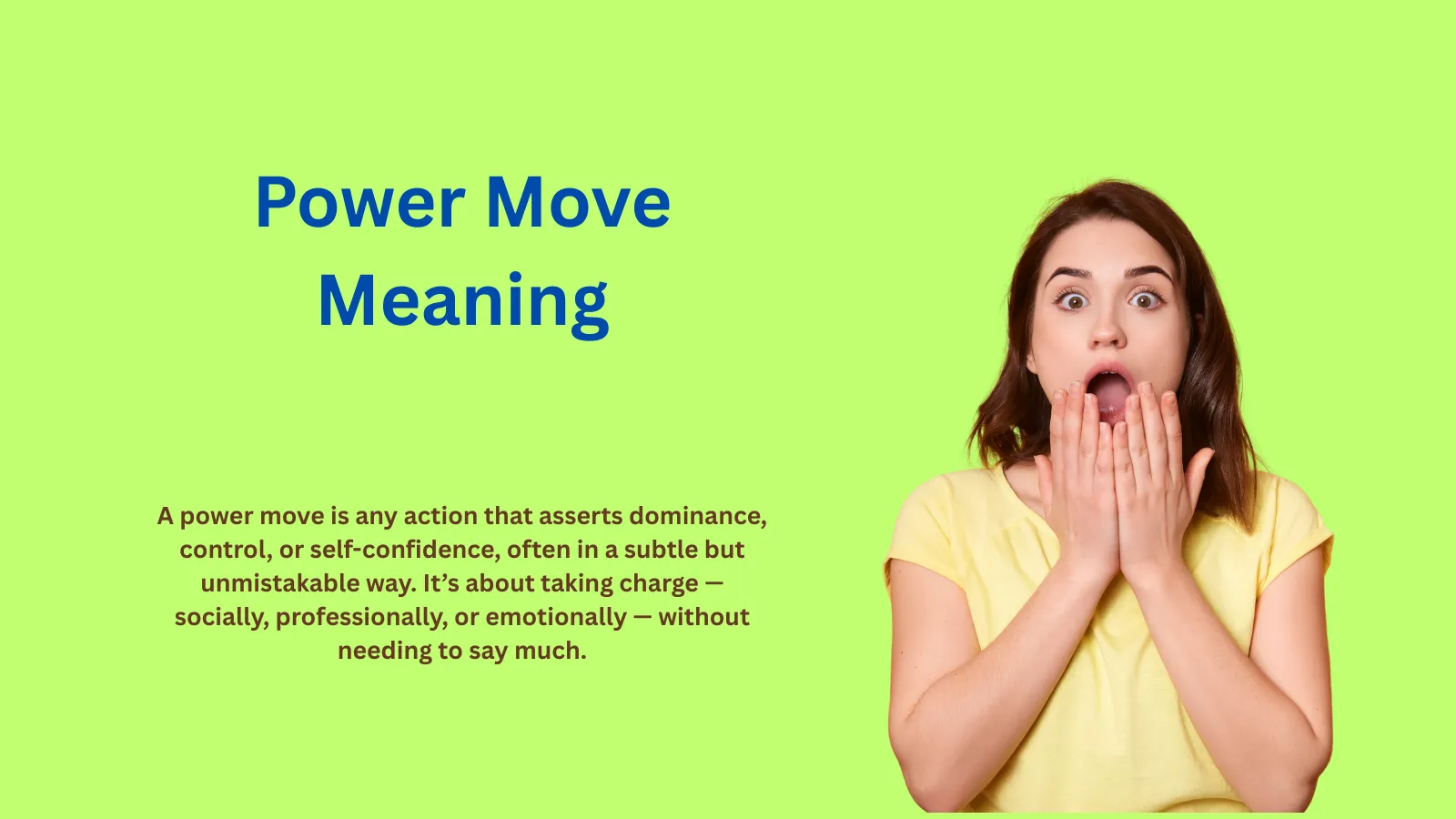From boardrooms to social media, everyone’s talking about power moves — bold actions that instantly grab attention and show dominance or confidence.
Power move meaning refers to an assertive act, decision, or gesture that displays confidence, authority, or control in a situation. It’s often used to describe behavior that subtly (or openly) shifts the balance of power in your favor.
You’ll often hear things like:
- “Ignoring the insult was such a power move.”
- “She showed up late to her own meeting — total power move.”
In this article, we’ll break down what a power move really means, where it comes from, how it’s used, and why it’s become part of everyday language and internet culture.
What Does “Power Move” Mean?
A power move is any action that asserts dominance, control, or self-confidence, often in a subtle but unmistakable way. It’s about taking charge — socially, professionally, or emotionally — without needing to say much.
It can be physical (like maintaining unbroken eye contact), social (like staying calm during conflict), or professional (like setting firm boundaries).
Example Sentences:
- “Quitting without explaining why? That’s a serious power move.”
- “He calmly walked away mid-argument — a real power move.”
Origin of the Term “Power Move”
The phrase “power move” originated from business and social dynamics in the 1980s and 1990s, referring to behaviors that conveyed dominance or control in professional settings.
As pop culture evolved, the term spread to sports, politics, and online slang, eventually becoming shorthand for confidence and strategy in any scenario.
By the 2010s, social media turned “power move” into a viral phrase — often used humorously to describe overconfident or ironic behavior.
Example:
“He brought his own chair to the meeting — literal power move.”
How “Power Move” Is Used
The meaning of power move changes slightly depending on context. Let’s look at its common uses:
1. In Professional Settings
Used to describe strategic or confident decisions.
“Negotiating your salary instead of accepting the first offer? That’s a power move.”
2. In Relationships
Used when someone takes control or sets emotional boundaries.
“Not replying immediately to a manipulative text? Power move.”
3. On Social Media
Often used humorously to describe bold, petty, or clever actions.
“Bringing your own snacks to a restaurant — absolute power move.”
4. In Pop Culture & Sports
Describes assertive, game-changing actions.
“That dunk in the last 10 seconds? Power move energy.”
Traits of a Power Move
Power moves share key elements — they’re confident, intentional, and emotionally controlled.
- Confidence: You act without hesitation.
- Control: You decide the pace or direction of the situation.
- Awareness: You know exactly what your move communicates.
- Restraint: Often, silence or calm behavior makes the biggest impact.
Example:
“She didn’t raise her voice once — and still won the argument. That’s real power move energy.”
Power Move vs Petty Move
It’s easy to confuse the two, but intent makes the difference.
| Feature | Power Move | Petty Move |
|---|---|---|
| Purpose | To assert confidence | To get revenge or attention |
| Tone | Calm and controlled | Emotional or sarcastic |
| Effect | Gains respect | Might cause drama |
Example:
- Power Move: “He walked out of the deal politely after spotting red flags.”
- Petty Move: “He canceled the deal just to get back at them.”
Examples of Modern Power Moves
Here are a few ways people use power move in everyday life and online slang:
- Career: “Leaving a toxic job without drama — that’s a power move.”
- Social Media: “Turning off your read receipts — power move.”
- Relationships: “Not reacting to jealousy games — pure power move.”
- Gaming: “Defeating the boss without using healing items — major power move.”
- Pop Culture: “Wearing pajamas to a red-carpet event — fashion power move.”
Each example shows confidence, self-awareness, and control — the essence of a true power move.
Common Misconceptions
- “Power moves are rude or arrogant.”
Not necessarily. True power moves come from calm confidence, not ego. - “Only powerful people make power moves.”
Anyone can — it’s about mindset, not status. - “Power moves are manipulative.”
Only if they’re done to harm or embarrass others. Genuine power moves inspire respect, not fear.
Pop Culture & Internet Slang Use
In online slang, “power move” has become a favorite meme format.
Examples:
“Waking up at 10 a.m. and calling it early — power move.”
“Deleting your ex’s playlist in silence — certified power move.”
The phrase often carries humor or irony — describing actions that are confident, ridiculous, or both.
Similar Terms & Alternatives
| Term | Meaning | Example |
|---|---|---|
| Flex | Showing confidence or status | “Posting gym results — casual flex.” |
| Boss Move | Taking control with authority | “Starting her own business was a boss move.” |
| Alpha Move | Dominant or assertive behavior | “He took charge immediately — alpha move.” |
| Mic Drop | Ending a conversation confidently | “She ended the debate with one line — mic drop.” |
Power Move in Professional Communication
While the term itself is informal, the idea behind it — confidence and strategic control — is essential in business and leadership.
Professional examples:
- “Delegating tasks effectively — that’s a power move in management.”
- “Saying no to overcommitment — power move for productivity.”
In formal writing, replace “power move” with:
- “Strategic decision”
- “Confident initiative”
- “Assertive action”
Final Thoughts
The power move meaning goes beyond slang — it represents confidence, control, and emotional intelligence.
A real power move isn’t about ego or dominance. It’s about knowing your worth, acting with purpose, and letting silence speak volumes.
So whether it’s a career choice, a social situation, or a witty comeback — remember: confidence, not arrogance, defines a true power move.

